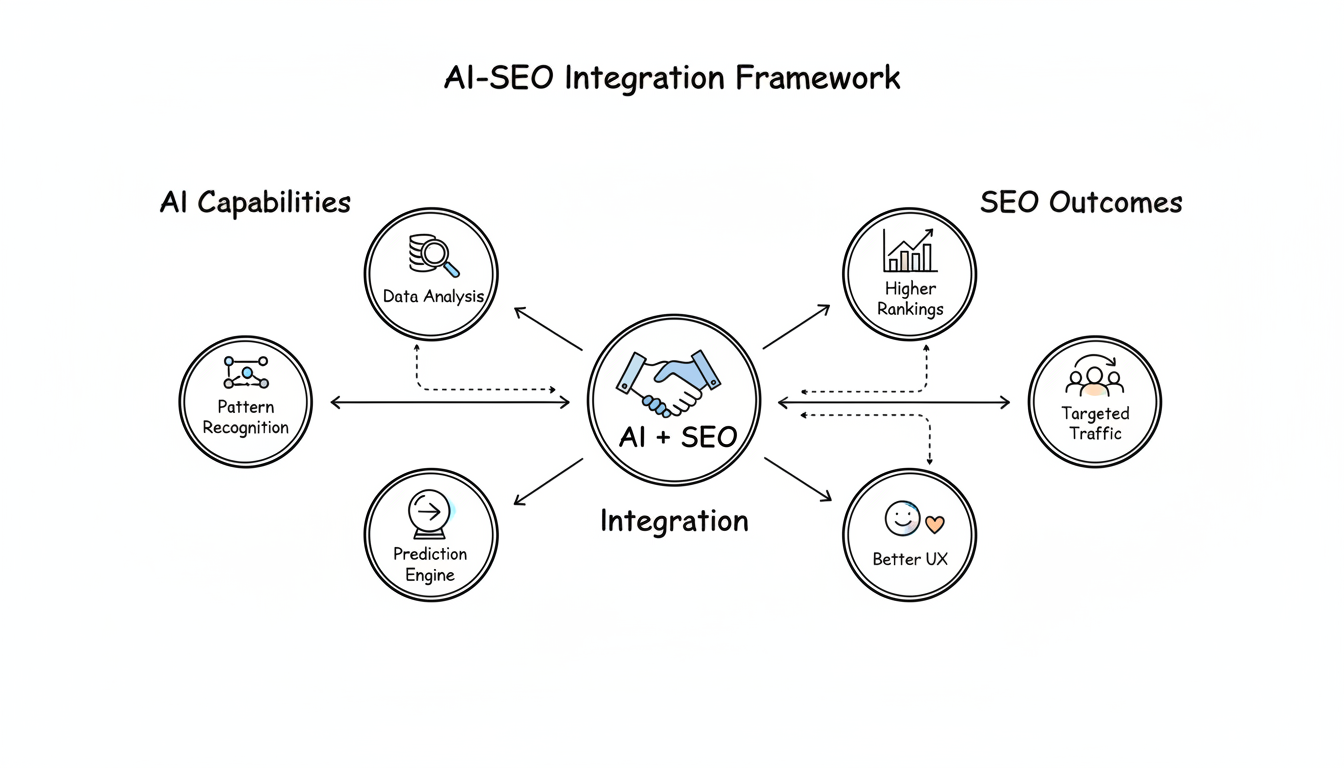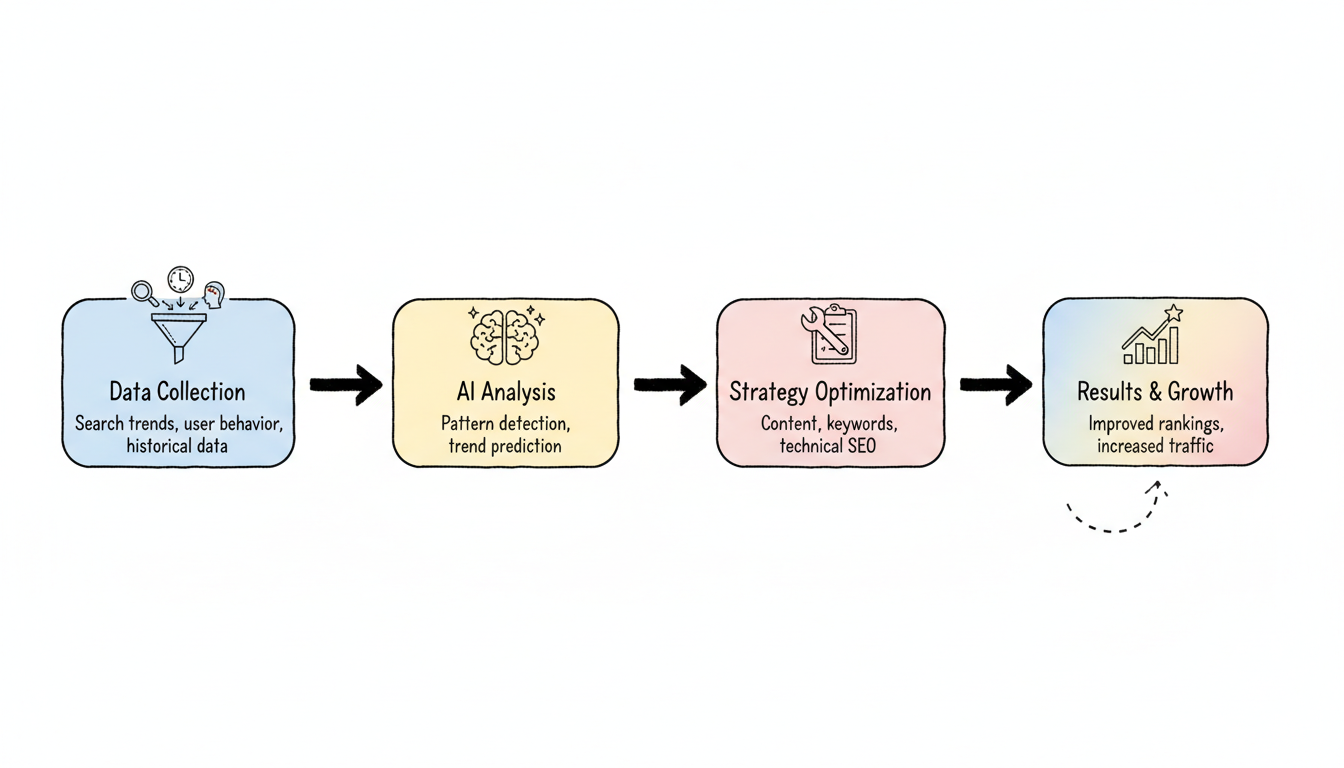In today's digital landscape, search engine optimization (SEO) plays a vital role in ensuring the visibility and success of online businesses. With the ever-changing algorithms and ranking factors employed by search engines, staying ahead of the curve can be a challenging task. However, with the rise of artificial intelligence (AI), SEO professionals now have a powerful tool at their disposal to future-proof their strategies and stay ahead of the competition.
Before delving into the role of AI in predictive SEO, it's essential to establish a clear understanding of what AI entails in the context of search engine optimization.
Artificial intelligence, in the realm of SEO, refers to the use of advanced algorithms and machine learning techniques to analyze vast amounts of data and automate various aspects of search engine optimization.
AI has revolutionized the way SEO professionals approach their strategies. Gone are the days of relying solely on manual processes and basic keyword research. The evolution of SEO strategies has been driven by the increasing sophistication of search engines and the need to keep up with their ever-changing algorithms.
In the early days of SEO, professionals would manually analyze websites and optimize them based on keyword density and other basic metrics. However, as search engines became more intelligent, these strategies proved to be insufficient. Search engines started to take into account factors such as user intent, context, and relevance, which required a more nuanced approach to optimization.
This is where AI stepped in. With its ability to analyze vast amounts of data and identify patterns, AI algorithms could provide SEO professionals with valuable insights and predictions. By leveraging AI, SEO professionals could now make data-driven decisions and optimize their websites based on accurate predictions of search engine behavior.
AI-powered SEO tools have become indispensable in the industry. These tools can crawl websites, analyze content, and provide recommendations for optimization. They can identify technical issues, suggest improvements, and even predict the impact of certain changes on search engine rankings.
Furthermore, AI has also played a significant role in improving the user experience. Search engines now prioritize websites that provide valuable and relevant content to users. AI algorithms can analyze user behavior and preferences to understand what users are looking for and deliver personalized search results.
As AI continues to evolve, so too will its impact on SEO. The future of SEO lies in the integration of AI and machine learning techniques into every aspect of optimization. From content creation to technical optimization, AI will play a crucial role in helping websites rank higher in search engine results and provide a better user experience.
AI and SEO converge in various ways, each contributing to the enhancement of the other.

Artificial Intelligence (AI) and Search Engine Optimization (SEO) are two powerful forces in the digital landscape. While AI is revolutionizing various industries with its ability to process and analyze vast amounts of data, SEO is essential for businesses to improve their online visibility and attract organic traffic. When these two forces come together, they create a synergy that can greatly benefit businesses in their quest for online success.
One of the key benefits of AI in SEO is its ability to process and analyze vast amounts of data at unprecedented speeds. AI-powered tools can swiftly crawl websites, identify patterns, and extract insights that would be impractical for humans to accomplish manually. This enables SEO professionals to make data-driven decisions and optimize their strategies more effectively.
Furthermore, AI can help identify areas of improvement in website structure, content quality, and user experience. By analyzing user behavior and engagement metrics, AI algorithms can provide valuable insights on how to enhance website performance and increase conversion rates. For example, AI-powered chatbots can analyze customer interactions and identify common pain points, allowing businesses to optimize their website and improve customer satisfaction.
AI's ability to analyze data and detect patterns makes it an invaluable asset when it comes to predicting future SEO trends. By analyzing historical data and identifying patterns in search engine behavior, AI algorithms can make accurate predictions regarding algorithm updates, fluctuations in rankings, and changes in user search behavior. This allows SEO professionals to proactively adapt their strategies to stay ahead.
Moreover, AI can help businesses stay on top of emerging trends and capitalize on new opportunities. By analyzing social media trends, consumer behavior, and market dynamics, AI algorithms can provide insights on emerging keywords and topics that have the potential to drive significant organic traffic. This enables businesses to create relevant and engaging content that resonates with their target audience, ultimately boosting their SEO efforts.
In conclusion, the intersection of AI and SEO is a powerful combination that can revolutionize the way businesses approach their online presence. With AI's ability to process and analyze vast amounts of data, and SEO's focus on optimizing websites for search engines, businesses can leverage these technologies to enhance their online visibility, attract organic traffic, and stay ahead of the competition.
Integrating AI into predictive SEO initiatives brings numerous advantages, helping businesses achieve better results and stay ahead of their competitors.
By leveraging AI algorithms and machine learning techniques, SEO professionals can make more accurate predictions about search engine behavior. This enables them to anticipate changes in rankings, identify new opportunities, and optimize their strategies accordingly. Improved prediction accuracy means staying one step ahead of the competition and maximizing the effectiveness of SEO efforts.
For example, AI can analyze vast amounts of data from search engines, social media platforms, and other online sources to identify patterns and trends. This analysis helps SEO professionals understand user behavior, preferences, and intent, allowing them to tailor their strategies to meet the needs of their target audience. With AI-powered predictive SEO, businesses can optimize their websites and content to align with user expectations, increasing their chances of ranking higher in search engine results pages.
In addition, AI can analyze historical data and identify correlations between different SEO factors and search engine rankings. By understanding these correlations, SEO professionals can make more informed decisions when it comes to optimizing their websites. For example, AI can identify that websites with a higher number of backlinks tend to rank better in search results. Armed with this knowledge, SEO professionals can focus their efforts on acquiring high-quality backlinks to improve their website's visibility and organic traffic.
AI-powered tools automate various time-consuming tasks within the SEO workflow, freeing up SEO professionals to focus on more strategic aspects of their campaigns.

From keyword research to content optimization and backlink analysis, AI tools can handle these tasks more efficiently, allowing SEO professionals to save time and allocate their efforts towards achieving better results.
For instance, AI can analyze large volumes of data to identify relevant keywords and phrases that have a high search volume and low competition. This helps SEO professionals in their keyword research process, enabling them to target the right keywords that have the potential to drive more organic traffic to their websites.
Furthermore, AI can assist in content optimization by analyzing the content on a website and providing suggestions for improvement. It can identify areas where the content can be optimized for better search engine visibility, such as improving keyword density, enhancing readability, and suggesting relevant internal and external links. By leveraging AI-powered content optimization tools, SEO professionals can ensure that their website's content is highly optimized, increasing its chances of ranking higher in search engine results.
AI can also streamline the backlink analysis process by automatically identifying and evaluating the quality of backlinks pointing to a website. This saves SEO professionals the time and effort of manually analyzing each backlink, allowing them to focus on acquiring high-quality backlinks that can positively impact their website's search engine rankings.
In conclusion, integrating AI into predictive SEO initiatives offers numerous benefits for businesses. From improved accuracy in SEO predictions to streamlining SEO processes, AI-powered tools and algorithms can help businesses stay ahead of their competitors and achieve better results in their SEO efforts.
As AI continues to advance and reshape the SEO landscape, it is crucial for businesses to future-proof their SEO strategies. With the rapid development of artificial intelligence, staying ahead of the curve is essential to maintain a competitive edge in the digital world.
But what does it mean to future-proof your SEO strategy? It involves more than just keeping up with the latest trends and algorithms. It requires a deep understanding of how AI is transforming the search engine optimization game and the ability to adapt and integrate these advancements into your plan.
One of the key steps in future-proofing your SEO strategy is to stay abreast of AI advancements and incorporate them into your plan. AI technologies are constantly evolving, and it is crucial to regularly update your knowledge about these developments. This includes understanding how search engines are using AI to improve their algorithms and deliver more relevant search results.
Furthermore, it is essential to ensure that your SEO team is well-versed in leveraging AI to maintain a competitive edge. This may involve providing training and resources to help them understand and utilize AI tools effectively. By equipping your team with the necessary skills, you can harness the power of AI to enhance your SEO efforts.
Integration of AI into SEO strategies requires a mindset shift. It is crucial to recognize that AI is not a replacement for human expertise but rather a tool that enhances SEO efforts. Emphasizing the collaboration between AI technologies and SEO professionals is key to achieving optimal results.
AI can help automate repetitive tasks, such as keyword research and data analysis, allowing SEO professionals to focus on more strategic and creative aspects of optimization. By working hand in hand with AI, SEO experts can leverage its capabilities to gain deeper insights, identify patterns, and make data-driven decisions.
Moreover, AI can assist in understanding user intent and delivering personalized search experiences. By analyzing user behavior and preferences, AI algorithms can help optimize content and improve website rankings. This level of personalization can significantly enhance the user experience and drive higher conversion rates.
In conclusion, future-proofing your SEO strategy with AI is not just about keeping up with the latest trends; it's about embracing the transformative power of artificial intelligence. By staying informed, adapting your approach, and leveraging AI technologies, you can position your business for long-term success in the ever-evolving digital landscape.
While the benefits of AI in predictive SEO are significant, businesses must also be aware of the challenges that come with its implementation.
One common concern is the fear that AI technology will replace human SEO professionals. However, it's crucial to understand that AI is a tool that supports and augments human expertise, rather than replacing it entirely. Maintaining a balance between human intuition and AI-supported insights is key to leveraging the full potential of AI in SEO.
Implementing AI technologies into existing SEO workflows may pose challenges such as data compatibility, integration with existing tools, and the need for specialized expertise. To overcome these obstacles, it is crucial to invest in proper training, seek expert guidance, and stay updated on emerging AI tools tailored for SEO professionals.
In conclusion, the role of AI in predictive SEO is becoming increasingly essential in future-proofing your strategies. By harnessing the power of AI, SEO professionals can improve accuracy in predictions, streamline processes, and adapt their strategies accordingly. However, it is important to stay vigilant, address concerns, and overcome obstacles to maximize the potential benefits of AI-powered SEO. Embracing AI as a supportive tool rather than a replacement for human expertise is the key to staying ahead of the game in the ever-evolving world of SEO.
By submitting this form, you agree to our Privacy Policy and Terms & Conditions.